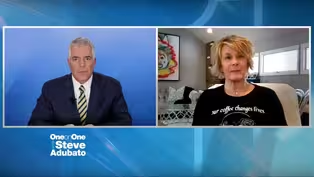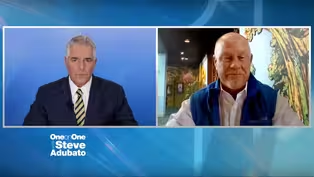One-on-One
The Role and Responsibility of Local Media in our Democracy
Clip: Season 2024 Episode 2709 | 9m 35sVideo has Closed Captions
The Role and Responsibility of Local Media in our Democracy
Christopher Kelly, Vice President of Content at NJ Advance Media, joins Steve Adubato for an important conversation about the role and responsibility of local media in our democracy.
Problems playing video? | Closed Captioning Feedback
Problems playing video? | Closed Captioning Feedback
One-on-One is a local public television program presented by NJ PBS
One-on-One
The Role and Responsibility of Local Media in our Democracy
Clip: Season 2024 Episode 2709 | 9m 35sVideo has Closed Captions
Christopher Kelly, Vice President of Content at NJ Advance Media, joins Steve Adubato for an important conversation about the role and responsibility of local media in our democracy.
Problems playing video? | Closed Captioning Feedback
How to Watch One-on-One
One-on-One is available to stream on pbs.org and the free PBS App, available on iPhone, Apple TV, Android TV, Android smartphones, Amazon Fire TV, Amazon Fire Tablet, Roku, Samsung Smart TV, and Vizio.
Providing Support for PBS.org
Learn Moreabout PBS online sponsorship(upbeat music) - That's right.
He's back.
We got him back.
Christopher Kelly is Vice President of Content for NJ Advance Media.
Good to see you, Chris.
- Good to see you, Steve.
- Let's let everybody know what NJ Advance Media is.
It's a media platform.
Lots of platforms.
Go ahead.
- Lots of platforms.
NJ.Com, of course, is our flagship website.
And The Star-Ledger, one of our newspapers also includes South Jersey Times, Times of Trenton, but NJ Advance Media, sort of the umbrella for all of that.
- You know, you and I had a conversation last time, big picture conversation about media, where we are, the role of digital media, but I wanna be even more specific.
What do you see as the role of NJ Advance Media, particularly on the digital side, in promoting a healthy, vibrant, representative democracy that thrives because free media is critical in that.
Please.
- It's the question.
It's a big question, and it's the question that we face every day.
I think local media is in a privileged position in this fight, in this challenge in front of us because what local media can do is really help shore up people's confidence in media, because we report on the things that you see, that you go outside your door and you see, and you see the media is reflecting this accurately, honestly, objectively and that's what builds up trust.
And I think that's what we're in such danger of losing in this realm where, you know, people's opinions are formed on social media, are cemented by their echo chamber of friends and followers, are manipulated as AI gets into the equation and deep fakes and images you can't really trust.
You gotta take it back to local media and what local news can do, which is be honest and reflect honestly about what's going on outside your door, outside my door.
- Chris, go back to AI, the artificial intelligence issue.
The potential negative impact of AI on the information slash news business, particularly at NJ Advance Media.
- It's really unnerving.
And I worry less about, you know, are the robots coming for reporters jobs?
I don't think they are.
There's things that robots can't do.
Robots can't go to, you know, go and talk to people and you know, probe what's going on in their minds and their worlds.
They can't uncover wrongdoing and things like that.
Where I worry is the way that information can get out there that is false, that can be so easily manipulated and become, you know, narrative, become a kind of fact that we have to fight against.
You know, we've all seen the photos that are completely fake, but look unnervingly real.
There's countless variations of that that we're gonna have to run up against and really, really be prepared to fight against and educate people against.
And, I don't know what's coming.
It's a big, big, big brave new world - Truth.
Right?
I remember in a previous White House, the term alternative facts.
I think it was Kellyanne Conway said that, you know, we engage in alternative facts.
First of all, can we agree there's no such thing as alternative facts.
- I would like to agree with you on that.
Yes.
- Can we also agree that they're just alternative opinions?
- Yep.
But you know, I think the challenge for all of us right now is that people get to curate their narratives.
You know, Facebook- - Tell folks what that means.k When someone says, "I love Trump.
I'm in the MAGA movement and I see news all the time that shows me I'm right."
- And that news is being served directly by you, by an algorithm that knows the things that you're interested in engaging with, knows the directions of your ideology, knows what you're going to want to see.
And so it becomes a kind of self-fulfilling prophecy.
It's the same thing that when you, you know, Google, I wanna buy a sweater from, you know, J.
Crew, you're suddenly getting dozens of ads for all different sweaters on your Facebook feed.
It's the same algorithm, but this time it's populating your feed with information that is, you know, designed to affirm your biases and affirm your very specific point of view.
And then, you know, when you add in the fact that there's not a lot of objective fact out there.
We're flooded with, you know, objective facts colored by opinion, by falsehoods, by manipulations.
It's really, really easy to decide something is true in that context and it's really, really hard to fight against.
- But it's also true for those who hate Donald Trump, who believe that those who support him are all racists, and MAGA is a racist, xenophobic group of people who are against anyone other than who they are.
They consume, those folks consume information that reinforces their point of view.
Is it any different, regardless of what your political ideology is?
Please.
- We talk about this all the time.
The confirmation biases goes on both sides of the ideological spectrum.
You know, we all have the tendency to surround ourselves with information and with people who are going to confirm our view of the world.
So where does that leave the news media?
And what that means we have to do is be as clear-eyed as possible, be as open-minded as possible to make sure we're listening to both sides and reporting thoughtfully.
Analytically we're not gonna, you know, pass off falsehoods as fact.
We're gonna challenge when one side says something we know objectively to be false.
But if our society doesn't have in the middle of all of this, the bulwark of an objective, clear-eyed media, we're in trouble.
We're in big trouble.
Before I let you go, lemme ask you this, the economics of your business.
For us, if we're not bringing in sponsors, underwriters, corporations, foundations, if we're not doing that, we can't do this.
The economics of public broadcasting has evolved, the economics of the newspaper.
Listen, I said to you before we got on the air, I looked for my Star-Ledger.
Yes, I'm one of the people who still gets newspapers.
Yes, I go on NJ.com and a whole range of other sites.
But the Star Ledger no longer prints on Saturdays, trying to save money.
LA Times has laid off 115 people today.
Today.
That being said, Chris, curious, how much can you just focus on content, or is it content with an eye towards economics?
Please.
- It has to be content with an eye towards economics.
And I think that goes for, you know, regardless of what your model is.
I mean, I think a lot of the nonprofits are facing the same challenges.
If you're doing work that no one's consuming, you know, it's really, really impossible to sustain that financially.
And if you're in a world where, you know, people want a very specific, you know, a very sort of atomized take on what they think the news can be, it's very, very, very hard.
You have to sort of have a firm faith and confidence in what I said at the top of this interview, which is that people ultimately, whether they realize it or not, need local sources of information that is objective, that is clear-eyed.
And you gotta stay true to that mission before you go down the rabbit hole of, you know, pandering to one side or the other, or one view.
Doing all this while keeping an eye on the balance sheets is no easy task.
And it's really, really worrisome.
Certainly as you look out at the landscape, you mentioned the LA Times, there's been, you know, probably a dozen others, Sports Illustrated, the Baltimore Banner.
I mean, this is just off the top of my Twitter feed in the last few days, you know.
So we're headed into some really, really challenging times.
I think we're also headed into a year where you're gonna see why, you know, an objective mainstream media still really, really matters - Now more than ever.
Hey, Chris, thank you.
Christopher Kelly is Vice President of Content NJ Advance Media.
Chris, I promise we'll continue this conversation with you and your colleagues because we're all in this together.
Thanks, Chris.
- Anytime.
Thanks, Steve.
- I'm Steve Adubato.
That's Chris Kelly.
We'll see you next time.
- [Narrator] One-On-One with Steve Adubato has been a production of the Caucus Educational Corporation.
Celebrating 30 years in public broadcasting.
Funding has been provided by Fedway Associates, Inc. Valley Bank.
The North Ward Center.
Delta Dental of New Jersey.
New Jersey Sharing Network.
The Russell Berrie Foundation.
The Port Authority of New York and New Jersey.
Atlantic Health System.
And by the Adler Aphasia Center.
Promotional support provided by ROI-NJ.
And by Meadowlands Media.
- Hello, I’m Donald Payne, Jr.
Congressman for New Jersey’s 10th District.
One organ and tissue donor can save as many as eight lives, and improve the health of another additional 75 people.
That is why I encourage everyone to register as an organ donor.
For more information about organ donation, please visit www.NJSharingNetwork.org
Ethan & The Bean's Employment Model Breaks Barriers
Video has Closed Captions
Clip: S2024 Ep2709 | 8m 51s | Ethan & The Bean's Employment Model Breaks Barriers (8m 51s)
Make-A-Wish NJ Celebrates 40 Years of Granting Wishes
Video has Closed Captions
Clip: S2024 Ep2709 | 10m 8s | Make-A-Wish NJ Celebrates 40 Years of Granting Wishes (10m 8s)
Providing Support for PBS.org
Learn Moreabout PBS online sponsorship
- News and Public Affairs

Top journalists deliver compelling original analysis of the hour's headlines.

- News and Public Affairs

FRONTLINE is investigative journalism that questions, explains and changes our world.












Support for PBS provided by:
One-on-One is a local public television program presented by NJ PBS

